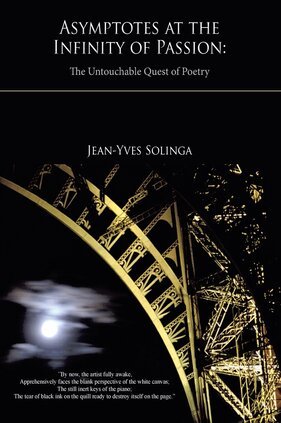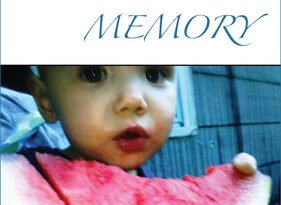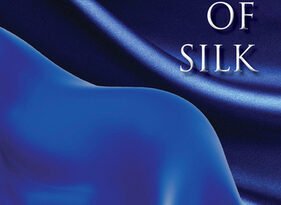Asymptotes at the Infinity of Passion: The Untouchable Quest of Poetry
by Jean-Yves Solinga
($19.95, paperback, 166 pages, with 6 photographs)
![]()
“By now, the artist fully awake,
Apprehensively faces the blank perspective of the white canvas;
The still inert keys of the piano;
The tear of black ink on the quill ready to destroy itself on the page.”
INTRODUCTION
I find the analogy of an asymptote a good visual for what a poet regularly resorts to in an attempt to touch an idea or an ideal: May that goal be political (injustice, prejudice), intimate (walking along the Seine when the lights on it start to sparkle), historic, societal (pollution, anti-Semitism, the indescribable horrors of war and the longing for peace) or cosmic (the future of mankind). None of these topics is by their nature and scope easily contained; but the natural density of poetry is well suited in reaching an approximate verbal description to mould the subject and try to apprehend it.
Albert Camus used the mythological Sisyphus pushing a rock endlessly up a hill to encapsulate the idea of the Absurd. It worked like a charm on my high school mind and sent me on a quest to know more about the Greek King and the French philosopher and to learn from both. And so, along the same visual equivalent, I have chosen the title Asymptotes at the Infinity of Passion: the Untouchable Quest of Poetry for this collection of poems.
An asymptote, generally speaking, is a line [value, point or limit] on a graph that is approached by another line [or value] but is never touched: This separation (no matter how minute) is kept into infinity.
I have often thought of the application of this concept when studying French Medieval poems. In some, the poet would look upon the figure of the Virgin Mary in her duality. That is: as a woman and a divinity. Both represented the unapproachable or untouchable presences: no matter the passion or intensity of the suitor or humble servant.
Thus, notwithstanding the fervor or skill of the poet for the object of desire, the moment in the past, the reparation of injustice, the unspeakable horrors of such a thing as the enslavement of another, the product of the mind of the artist in front of such a challenge is going to feel wanting for something: compounded by the inapproachable and inenarrable makeup of the topics.
It is along with the unbounded, unbridled, infinite passion of the poet’s soul, that poetry tries to recreate and especially allow his reader to experience that same passion, that same moment, that same angst or that same anger through his art [“From Both Sides of the Canvas,” “Esthetics of Cruelty,” “Reflected Gaze”]. It is telling that some poems make reference to the vision and intensity of artists such as Caravaggio, Courbet, and Renoir.
The sources of my poems in this work are what poems, at their best, must often be: the distilled ingredients of life and living. Tasting, reflecting and reviewing moments.
But by nature, and as a conscious esthetic choice, I like to avoid direct biographical references. Therefore in the rare or unavoidable occasions to the contrary, I willingly acknowledge the personal reference and if necessary give any helpful witnessed hints to reinforce and allow immediacy to the words [“Trailways Idyll,” “Le train bleu”]. Although, at all times, poetic license acts as a veil of protective fiction. And like Montaigne, looking for a universal trait locked in the particular act.
Therefore, rather than my particular life, I like to think that the reader would be more interested in the experiences of a Jorge Semprùn or a Primo Levi’s: “Of Gypsies, Jews and Others,” “Between the Jehovah Witness and the S&M Prostitute,” “Historical Monument 3rd quarter of the Twentieth Century.”
Nevertheless, even at its seemingly most intimate or personal, my lyrical poetry aims at a wider meaningful literary distance that a dab of fiction affords. I always look for the effect that form and substance take on from an outsider’s viewpoint. So, even at its most voyeuristic, I treat my poetry as a movie script: Therefore… the effect. [“Return to Paris,” “Sanctuary,” “The Replaceable Soldier”]
In a quote of Zachary Leader by Sam Tarenhaus regarding Saul Bellow [n.y.t.b.r.]: “Bellow borrows real-life qualities and oppositions in drawing his characters, then exaggerates them to meet dramatic or fictional ends,” Tarenhaus adds, “In other words, he [Bellow] was a novelist.” [My italics]. I like that. It is for this reason that I never forget that I am writing poetry and not biographical non-fiction. [I cannot get my head around the concept of bio-fiction, which sounds too much like non-alcoholic wine]
Some poems are purely personal or familial-folkloric experiences [“Luciana”], the historical critique or commentary [“The Train Engineer” and coexisting in the guilty contagion of the German occupation of France]. While others are cosmic [“Just a man in a turtle neck,” “The Genesis Revisited.” Others, historic or about social reflections about racial and gender issues [“A Place at the Table,” “A Post Modern Woman,” “Billie Holiday and Édith Piaf,” “Androgyny.”]
There are many tangential references to the general literary, philosophical and artistic schools of thought: Existentialism; Absurdism; Impressionism; Romanticism etc. It is not only my vision of what good, intelligent writing should use; but it is also a perfect shortcut for making a point and or linking my poetry to a long and fertile line of human thought. As the adage goes: even atheistic writers make use of God or the Bible for artistic ends. [“Fall from Perfection,” “Jesus… aspiring rabbi and capable carpenter.”]
Paris [“As the lights on the Eiffel Tower start to sparkle”] plays (as usual) a privileged part in this book. The city, once more, took a life of its own as I began writing. It seems the French expression “les mots appellent les mots” [words bring out more words] is still in play here. A couple of poems set in the proverbial walk-up of some Parisian hotel room, in the ferment of the nineteen sixties and seventies [“In Lieu of a Painting,” “Paris Saxophone Solo”], turned into more poems and especially into this verbal explosion of images that I decided to keep separately: “Manifesto” [“Return from Paris”]. It is a sort of blueprint/rite of passage catchall poem, containing all sorts of grievances, hopes and beliefs: the Vietnam War, Racism and the glory… the absolute un-reconstructability of youth… well… it may, in the final analysis, be possible to reconstruct the latter: using infinite passion as the paintbrush [“Tremors of the Universe”].
This collection of poems is divided into four sections that generally fall into reflections on my arbitrary determination of the various drives of mankind: its emotional side; its aggressive history; the societal side; and its place in the cosmos. I claim some author’s privilege in the resulting insertion of particular poems: especially in the societal section. Furthermore, I chose a center default as well as a liberal capitalization policy at the beginning of the next verse.
Jean-Yves Vincent Solinga
Gales Ferry, CT. 2015




